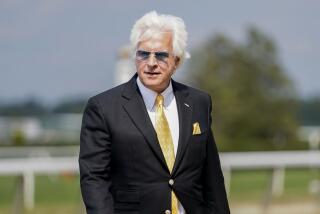James Traficant Jr., expelled from Congress in 2002, dies at 73
- Share via
James A. Traficant Jr., a self-described “junkyard dog” of a politician who became the second person to be expelled by Congress since the Civil War, died Saturday. He was 73.
Traficant succumbed to injuries sustained Tuesday when a vintage tractor he was putting away in a garage at his farm outside of Youngstown, Ohio, flipped over on him, said his wife, Trish Traficant. He died in a hospice facility in Poland, Ohio, near Youngstown.
“We don’t know what happened yet,” she told The Times, regarding the accident. “He didn’t have a heart attack or anything like that.”
In July 2002, Congress voted overwhelmingly to expel Traficant, a nine-term Democrat, after he was found guilty of taking kickbacks from staff members and pocketing bribes in return for political favors.
A week later, Traficant was sentenced to eight years in prison. At the time, he vowed to run again and asked the judge to incarcerate him in a facility in Ohio, so that he could remain eligible.
His defiance, even as he was led away in handcuffs, was a proper closing flourish for a politician who had made a career of controversy and flamboyance. He eschewed the straight-laced look of Congress by wearing denim suits, bell bottoms, skinny ties and a puffy hairpiece that looked like a small mammal.
He peppered his speech with profanity. He closed floor speeches by saying, “Beam me up, Speaker.” He voted far more often with the Republicans than with his own party, though in the end both parties voted nearly unanimously to oust him.
Traficant’s conviction and expulsion from Congress was the most prominent chapter in a long-running effort to clean up pervasive public corruption in Mahoning County, Ohio, where Youngstown is the county seat.
“His passing is obviously the passing of a political icon in the Mahoning Valley,” state Rep. Robert F. Hagan, who lost the 2000 Democratic congressional primary to Traficant, told The Vindicator, Youngstown’s local paper. “Good, bad or indifferent, he had an incredible amount of charisma.”
The corruption probe was touched off by an assassination attempt against a newly elected county prosecutor, Paul Gains, who was shot three times and left for dead in his home on Christmas Eve 1996. Gains had unseated an incumbent with ties to the area’s organized crime network. The Mahoning investigation led to the convictions of more than 70 local residents, including business people, the former prosecutor, and a county sheriff. Traficant’s charges were not connected to the shooting.
At the time of his trial, he was still hugely popular, attributable to the fact he was a working-class hometown boy who made sure people never forgot it.
James Anthony Traficant Jr. was born May 8, 1941, in Youngstown, Ohio, to James, a truck driver, and Agnes, a homemaker. At the time, the city bustled with European immigrant families, such as Traficant’s Italian and Slovak relatives. Steel mills hummed. A blue-collar middle class sent their children to Catholic schools and, eventually, universities.
Traficant graduated in 1963 from the University of Pittsburgh, where he played football. He went on to earn two master’s degrees from Youngstown State University, one of them in counseling. From 1971 to 1981, he ran Mahoning County’s drug program — at a time when the steel mills began to close and unemployment and drug use spread.
In 1980, Traficant won his first election, as county sheriff. He quickly gained popular support and national renown when he went to jail for three days for defying a court order to enforce foreclosure notices against unemployed homeowners.
In 1983, while still sheriff, he faced his first federal bribery charges. Prosecutors had a recording of him accepting $163,000 from members of organized crime. Though not a lawyer, Traficant defended himself in the case and argued he accepted the money because he was conducting his own sting operation. The jury of locals exonerated him.
Traficant’s successful defense helped him win his first term to Congress in 1984, and he won by large margins in each of his seven later reelection bids. He delivered federal money to his district, which was fast losing private capital. He got a second federal courthouse built in Youngstown, secured upgrades to the local air reserve base and the civilian airport, and funneled $26 million toward a community center.
He also drew attention for defending Ukraine-born Ohio resident John Demjanjuk, who was convicted by an Israeli court of being “Ivan the Terrible,” a notorious concentration camp guard during World War II. Traficant insisted the trial was unfair and that Demjanjuk was the victim of mistaken identity. The conviction was overturned by the Israeli Supreme Court, though Demjanjuk was later convicted by a German court.
When Traficant was indicted again in 2002 on 10 counts including bribery and personal use of public funds, prosecutors charged that he made one employee hand over half his monthly salary and that the mob offered him services in exchange for government contracts. Over the 21/2-month trial, there was testimony that Traficant had staffers shovel manure on his farm and strip and repaint the Washington, D.C., houseboat where he lived.
Traficant once more chose to defend himself. Antics ensued. He asked of nearly every witness called: “Did I ever hug you?” He repeated questions a dozen times. He yelled at the prosecutors. At one point, he shouted at a witness that he was lying under oath, prompting the judge to place him in something of a courtroom timeout at his own table.
After the outburst, he told The Times: “I never do anything without a reason. The courtroom is a theater.”
Traficant insinuated in his defense that the federal government had a “vendetta” against him after failing to convict him in 1983, and he chalked up his courtroom missteps to being “the son of a truck driver.” Nonetheless, he was found guilty of all charges.
He ran for Congress the same year he was convicted but lost to an aide, Tim Ryan. Traficant was released from prison in September 2009 and ran for his old seat once more in 2010 as an independent, only to lose again to Ryan.
From then on he lived a quiet life on his farm in Greenford Township, near Youngstown, according to the Associated Press.
In addition to his wife, to whom he was married for 46 years, survivors include his daughters Elizabeth Chahine and Robin O’Grady.
Twitter: @neelaeast
Times staff writer David Colker contributed to his story.
More to Read
Start your day right
Sign up for Essential California for the L.A. Times biggest news, features and recommendations in your inbox six days a week.
You may occasionally receive promotional content from the Los Angeles Times.







